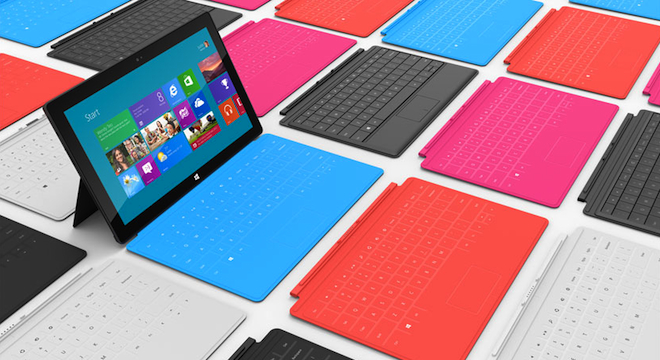Microsoft last week made a splash when it announced its plans to release its first-ever in-house tablet computer, the Microsoft Surface. The device, which will run Windows 8 and which Microsoft said would be released in the fall, is already making waves through the software development community, but not in a uniformly positive way.
Although previous Windows developers are rallying behind the device, developers for competing mobile operating systems by Apple and Google are largely unimpressed so far.
“Surface is an exciting new development that shows the huge potential that Windows 8 and the Metro UI will deliver for users,” wrote Maureen Miller, a spokesperson for Corel, a graphics application company that is perhaps best known for its program CorelDraw, in an email to TPM.
Another Windows developer, Kuwaiti-based Bashar Lulu, was even more emphatic about the rallying effect that Microsoft’s Surface would have on app development for the company’s upcoming Windows 8 operating system.
“Simply put, it will renew interest in the ecosystem, enticing more and more developers, and more importantly, companies to jump onto the Windows 8/RT bandwagon,” Lulu told TPM in an email. “It shows Microsoft’s commitment, and it shows that there really is a product that can match and outperform the iPad, not only on the hardware level, but on the software level as well.”
Analysts agree that in order to compete with Apple, which leads the global tablet market by a large margin, and Google, which holds up a distant second, Microsoft will have to offer a compelling ecosystem of applications written by third-party developers and other companies. Microsoft recently boasted that its app store, called the Windows Phone Marketplace, carries over 100,000 apps.
Comparisons to the “iPad,” are inevitable, but whether Microsoft’s new device family is comparable to Apple’s in terms of performance, battery life, and sheer appeal to consumers remains to be seen. Developers of Apple’s mobile operating system, iOS, versions of which run the iPad and iPhone, aren’t biting on Surface, or Windows 8, quite yet.
“As an iOS developer I really see no reason whatsoever to begin building for Windows,” wrote Juan Gallardo, an independent iOS developer, in response to a question posed on Quora. “The only devs that might even want to consider that would likely be lead engineers who have to be generalists and that would only happen when there is a strong enough demand with Windows mobile apps. As it is, most developers do not even want to bother with Blackberry who has a large market share.”
Microsoft showed off two tablets, a regular and “pro” version at a press event in Los Angeles on June 17, and offered a list of impressive-sounding technical specifications and iPad differentiators like a Touch Cover — a pressure-sensitive soft keyboard that doubles as a front shield for the Surface and comes in a variety of colors — as well as a built-in kickstand for propping up the device.
But Microsoft has yet to offer any concrete details concerning the devices’ prices, availability locations and dates, and even whether or not they will offer cellular network service or just wireless internet (WiFi) connectivity.
Embarrassingly, one of the Microsoft Surface prototypes demonstrated during its unveiling froze in the hands of Microsoft’s Windows president Steven Sinofksy, a cringeworthy moment that has quickly become a viral video and drawn comparisons to the unfortunate “Blue Screen of Death” that interrupted a Microsoft presentation featuring then-CEO Bill Gates back in 1998.
“Based on what has been announced and rumored about the price, I’m in ‘wait and see’ mode,” wrote Josh Jones, another iOS developer, on Quora. “I won’t totally dismiss it yet, but I don’t have high hopes based on Microsoft’s history with these sort of situations.”
Even previous Windows developers who have rallied around Surface couch their support in equivocal terms, also expressing a desire to get their hands on the untested device and semi-tested operating system (a release preview and a consumer preview of Windows 8 have been released, but the full version, like Surface, is due out in the Fall).
Developers will only begin writing Surface-specific apps, “when people see the product in their hands, and see its capabilities, especially the fact that this is a FULL operating system with basically no limitations, not like what’s available on other platforms,” wrote Lulu to TPM, noting that the “pro” version of Surface will ship with a version of Windows 8 that will be functionally identical to that on a desktop computer.”
Corel, too, qualified its support for Surface as being just an outgrowth of its longstanding support for Microsoft Windows and Windows 8, specifically.
“We’ve been working with Microsoft on Windows 8 development for almost two years,” Miller told TPM. “Because we have already committed to supporting Windows 8 and Metro across all our product groups, our plans haven’t significantly changed.”
Correction: This article originally incorrectly referred to the Microsoft app store as the Windows Store, a forthcoming app purchasing platform, when in fact the statistic of “100,000 apps” pertained to the existing Windows Phone Marketplace. This article also initially omitted the fact that Microsoft has released two preview versions of Windows 8, a consumer preview and a release preview (technically three in all, as there was a developer preview as well, but it was far more limited). We have since updated the article to correct these errors in copy and regret them.






